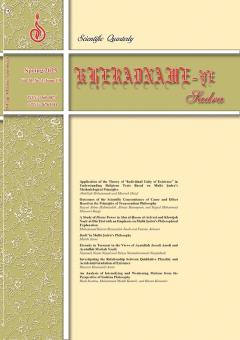Badā’ in Mullā Ṣadrā’s Philosophy
Subject Areas : ملاصدراپژوهی و اندیشۀ حکمت متعالیه
1 - Associate Professor, Islamic Philosophy and Kalam, Faculty of Theology and Islamic Sciences, University of Tehran, Tehran, Iran
Keywords: badā’, book of erasure and affirmation, divine decree, God’s prior knowledge,
Abstract :
One of the important Islamic teachings, particularly emphasized in the ḥadīths of the Shīʻī Imāms (‘a), is the theorem of “badā’ ”. “Badā’ ” means appearance after concealment and knowledge after ignorance. In this sense, it is rationally and traditionally impossible to attribute it to God. Therefore, the question is in what sense and how badā’ is attributed to God in Islamic narrations? Shīʻī thinkers have given various answers to this question. The present article reports and evaluates Mullā Ṣadrā's theory in this regard. His theory on badā’ is placed within his more comprehensive theory on divine knowledge. According to this theory, divine foreknowledge has four levels: 1) Inayat (providence), which is identical with God’s Essence and, thus, fixed; 2) Qaḍā’ (divine decree), which is identical with the essence of intellects and, thus, fixed; 3) Qadar (predestination), which is the knowledge of celestial souls, thus, fixed in some parts and variable in others. In Mullā Ṣadrā’s view, badā’ occurs in the variable part of qadar. Therefore, Mullā Ṣadrā’s response to the problem of badā’ is based on ancient physics and the theory of celestial spheres; a theory that is not acceptable at least in the contemporary epistemic paradigm. Hence, it is incumbent upon Neo-Sadrian philosophers to reformulate this theory by purifying it of its physical and astronomical premises. In doing so, without using the concept of “celestial soul”, they should demonstrate the existence of a class of immaterial beings that are subordinate to vertical and horizontal intellects and dominant over nature and have a changing and incomplete pre-knowledge of incidents in the material world. This very pre-knowledge can justify badā’.
